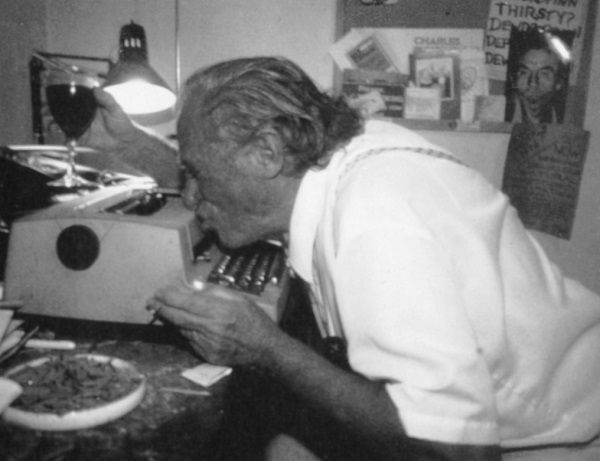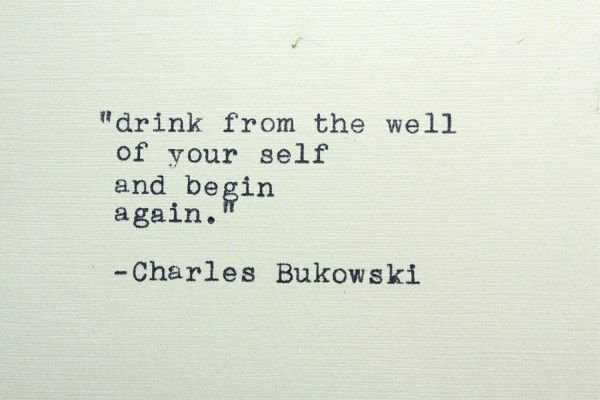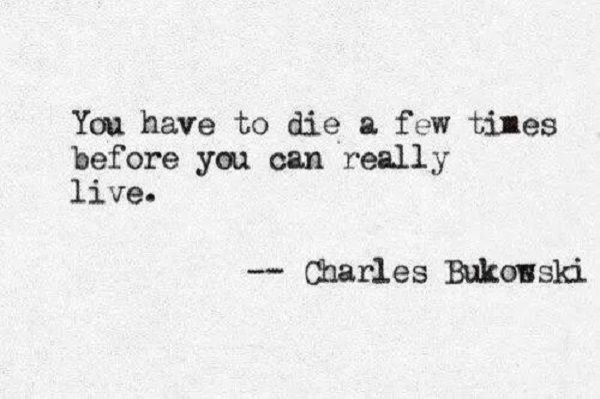Charles Bukowski - the damned genius
Bukowski is disgusting, his literary in real cases is terrible , he is a female-hunter, a narcissist, he simplify everything, and was never included in any anthology "The greatest American writers." Yet ... he is probably the greatest American writer of all time.

Honesty
Bukowski 's first four novels are highly autobiographical. He describes in detail his sufferings as a child (putting his parents in a very bad light without being particularly interested in this), tells about his experience with prostitutes, the lack of interest in retaining any job, his difficult attitudes with women and the absence of any respect for their ties to them ... And more, and more. His prose and poetry thoroughly document the people he hates, the authors he despises, the established structures in society for which he doesn't care. Most writers of fiction make up the things they write. They tell stories from their imagination. Bukowski doesn't know that. Whenever he tries to write a fiction (his latest novel, "Crime", is an excellent example), it is superficial. Even his poetry is not artistic. In one of his stories, Bukowski tells him how he sits at a bar alone, and a casual guy says, "It's terrible for all those burnt girls," and the writer says, "I do not know." Then the man and all the people in the bar screamed, "This guy is not interested in all the little girls burned to death." But Bukowski is honest: "It was a newspaper title. If it had happened in front of my eyes, I might have felt otherwise. " And refuses to go out, staying in the bar until his closing. Charles Bukowski does not cross a single border - he never writes about his daughter after she has reached a certain age. Every other author has so many other things he does not dare to tell - family, relationships, ex-boyfriends, children, work, bosses, colleagues, friends. And that's why he starts to think. As for Bukowski , a good example is his novel "Women", which describes in detail every sexual nuance in women dared to sleep with the writer after he has achieved a certain prominence. Most of these women are terrified after the book is published.

Consistency
Bukowski has two narratives published while he was young (24 and 26). At that time, almost all of his stories were denied by publishers. That's why he stops writing for ten years. Then, in the mid-1950s, it started again. Sends tons of poems and stories where he sees. It takes years to get it printed. Finally, it turns out that they have spent 15 years in which he wrote every day until he finally begins to earn his living as a writer. He received an advance for his first novel in 49 years ("Post" was released in 1971, then the writer was already 51) and subsequently the book proved to be financially successful. After 25 years of attempts at the end, Bukowski is a successful author. And all this perseverance goes on the backdrop of three marriages, dozens of jobs and heavy alcoholism ...

Survival
When we think about constant alcoholism, we usually compare it to being a homeless wanderer. Bukowski , on some deep level, realizes that he must survive. He can not just live on the street, or commit suicide, no matter the disappointment. He works in countless boring and clerical offices (as we see in Factotum) before he finally gets a job for the government (more secure than that couldn't have been), having been in the posts for 11 years. He does not fail to pay for his child (although he constantly writes about how ugly the mother is) and, to the best of his knowledge, has never been homeless or completely ruined from the early 1930s until he becomes a successful writer. And although he writes continuously about his poverty, he has a little legacy from his father, with a savings account and a relatively regular salary. His work in the post is documented in the novel "Post", considered one of his best - next to "All at the Table", Factotum and "Women", where, as in all his prose, the names are changed, but once as soon as you recognize the prototypes - the fiction becomes instantly a documentary.

Discipline
Imagine doing a 10-hour shift in the mail, getting back in, fighting with your wife, a boyfriend, or a semi-half-prostitute living with you, drinking a dozen beers and then ... writing. Bukowski does it every day. Most people want to write a novel, finish a picture or start their own business, but they do not have the necessary discipline to sit down and actually do it. When he is younger (at the beginning of his 20s and at the end of teenage years), he spent almost every single day in his library, getting to know the great writers. This love of literature is so strong that it replaces almost everything else in his life. Bukowski needs to write like them, otherwise he would die. And he tries every day. And so ... Bukowski - an alcoholic, a postman, a female hater, an adversary of the war, an enemy of peace, an adversary of all, hating anyone, perhaps not quite self-confident, infinitely honest. A writer who needs to write every day, otherwise he will die.
Nice article @godflesh!
thank you :)
@godflesh
Bukowski is a great source of inspiration for us Steemians, right? =)
Yes, right now I am reading his letters :D Really good inspiration :)
@godflesh
I think I will read me some Bukowski too, I have not read anything good in a long time...
Good pot
thanks
Excellent analysis, as you surmise, love him or hate him he truly was one of the greatest American novelists. What always struck me about his work is how incredibly self deprecating he is. This comes up especially in his telling of relationships with women. I'm curious if you have any thoughts on this? It always seemed to me like he thought of himself as an extremely grotesque human and couldn't understand how other humans could possibly be intimate with such a creature.